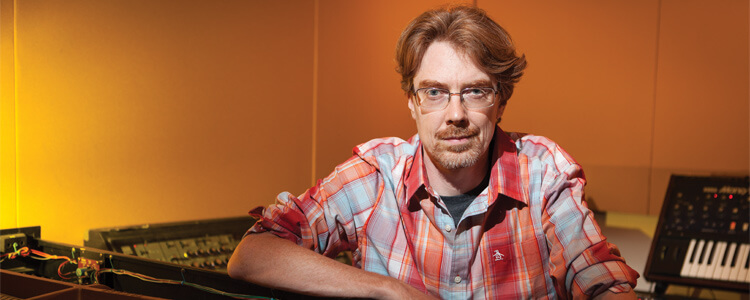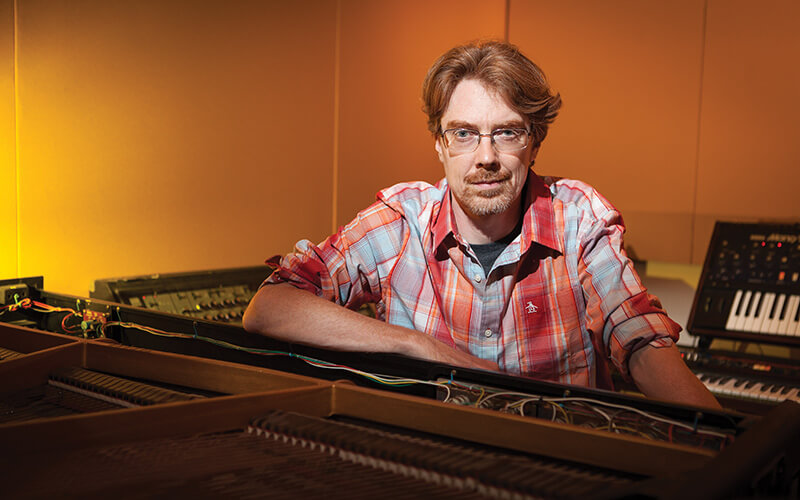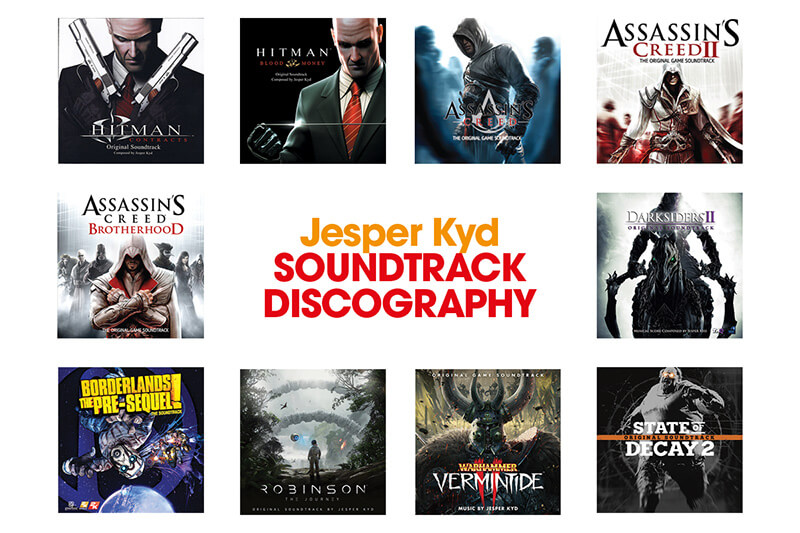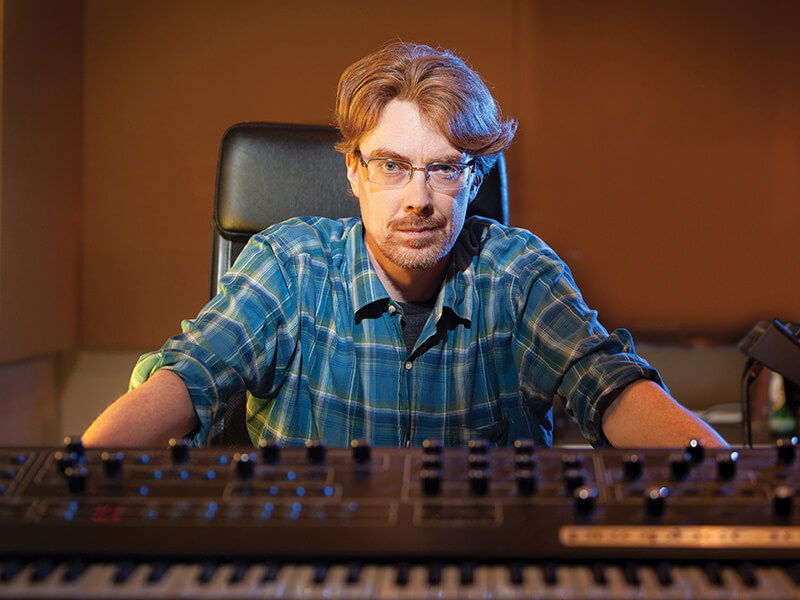Jesper Kyd Interview – Revelations
He’s one of the biggest, most accomplished names in an increasingly growing video game music industry. The BAFTA-Award winning Jesper Kyd was the principal composer for the flagship games of the Hitman and the Assassins’ Creed franchises, and he has navigated an eclectic career making music for film and television too. MusicTech speaks to him […]

He’s one of the biggest, most accomplished names in an increasingly growing video game music industry. The BAFTA-Award winning Jesper Kyd was the principal composer for the flagship games of the Hitman and the Assassins’ Creed franchises, and he has navigated an eclectic career making music for film and television too. MusicTech speaks to him about his successes and his creative approach…

In the last 20 years, the world of video gaming has grown to easily rival Hollywood as the largest entertainment industry in the world. The simultaneous development of consoles and large HD televisions means that, here in 2018, video games are no longer perceived as the province of the anorak as they were (by some!) in the early 90s.
They are now mainstream, wildly popular art forms, crafted with colossal budgets and vast creative teams that can exceed those afforded to motion pictures. The relatively new avenue of composing music for video games is therefore something that any music maker should consider as a very attractive proposition.
Danish-born Jesper Kyd began composing for games back at the very dawn of the medium, and has seen his role grow from being the provider of 8-bit bleeps to scoring with full-blown orchestras.
“My friends and I had been making demos for the European demo scene,” Jesper tells us of those early days. “It was quite an experimental art scene really. You’d have somebody programming and somebody making graphics, and then I would do the music. We would make these demos to basically show off what could be done with games. They were like little music videos on the Commodore 64 and Amiga computers.”
”We then basically founded a game company which I became a part-owner of in my late teens. This enabled us to keep doing what we loved and eventually our first game got sold to Sega.”
So Jesper’s love of music went hand-in-hand with his love of video gaming, even in those early days.
“I was pretty hands-on with the game-making process in those days. I’d grown up with programmers and graphic artists, so I always got to see how demos and 3D engines were made. But primarily I was doing the music – it was always my main passion and skill. But I definitely have a good insight into what it takes to create video games.”
Jesper tells us that he first set his sights on being a video game composer full-time after hearing what was being done in the UK: “I suppose my passion developed when I first got a Commodore 64 and started listening to all those British composers from the games that were around then.
“I really fell in love with the fusion of music and gaming. The Commodore had an analogue sound chip inside, so all these talented composers could utilise that to compose for games. That’s the first time that I’m aware of that a home computer really had, basically, a synthesiser built into it! So they were able to create very emotional and atmospheric music for those games.”
Everything is permitted
Of course, several decades later, Jesper is astonished at how much the requirements have changed. “Oh it’s massively changed since then, especially if you compare it to the beginning. The music I’ve just been talking about, these days we call it ‘chip music’ or ‘8-bit’ music. That kind of video game music is of its time and still has its own following. Now, of course, we can have anything we want.
“It was working on the soundtrack for Hitman 2 back in 2002 that opened my eyes to the fact that video game music had evolved to be anything you wanted – and could really rival movies. Using a live orchestra and a choir, for example, is light years ahead of the simplicity of 8-bit music. What we do today is really focused on integrating music with different layers, and more emphasis on music integration systems, as games are dynamic.”
But how does Jesper begin to tackle the enormous task of soundtracking a modern video game?
“Well I try to figure out the story and the narrative arc of the game first,” he says. “I need to fully grasp and understand what this game is about. At that point I usually start getting some initial ideas, and anything they have to show me as far as concept art, test footage or even a playable demo is very useful.
“I do find concept art particularly interesting because that’s what the developers are looking at themselves when they’re making the game. It’s rare that you get involved with the game when it’s so far along that they know what the visual/art style will be. I’m normally involved quite early and really, I prefer it that way.”
“It’s not unusual that I’ll be given a demo or shown some video of the game, and I start to think I have a handle on it but then two months later I’ll see the game and it’s totally different! There’ll be minor alterations that can really affect the mood, stuff like, ‘oh yeah, the level takes place at night now’.
“Those kinds of things can affect how I compose. If I have the concept art, at least I have a reference point that (hopefully) is not supposed to change a lot. I like to let that inspire me.”
“We have to experiment with what feels right so that when you run it against the screen with the game footage, does it stick? Then the melodies come along and I find that once we get locked into a certain tone and vibe, then it’s not long before we have lots of music to play with.”
Jesper Kyd’s soundtrack discography
Here’s a selection of highlights from Jesper’s glittering catalogue of video game credits from the last 14 years
From left to right: Hitman Contracts [2004], Hitman Blood Money [2006], Assassin’s Creed [2007], Assassin’s Creed [2009], Assassin’s Creed Brotherhood [2010], Darksiders 2 [2012], Borderlands The Pre-Sequel [2014], Robinson The Journey [2016], Warhammer Vermintide 2 [2018], State of Decay 2 [2018].

Jesper’s creed
As video games became more complex, Jesper’s career grew and grew, and he composed for more increasingly high-profile games. His compositions for the aforementioned Hitman series were perhaps his breakthrough work that brought him to the attention of the gaming community – winning a BAFTA for his soundtrack for Hitman: Contracts in 2005.
“But it was his work for the trailblazing first entry in the Assassin’s Creed franchise that really put his name on the game-composing map, as did the cinematic music for the game’s sequel (and subsequently its two sequels!) Assassin’s Creed II, Brotherhood and Revelations.
The Assassin’s Creed series has now become a sprawling multimedia franchise, with countless successive games, novels, action figures and even a big-budget movie starring Michael Fassbender, but Jesper remembers being there right at the start, single-handedly crafting the musical world of the much-beloved game series.

“Well (game developers) Ubisoft reached out and asked us to compose some ideas for their new ‘big project’ that they were excitedly working on. They were looking for a composer so I wrote a demo for them and the creative team selected it as the best of the bunch which was great.
“In the beginning there were conversations about hiring multiple composers as it was such a big game and it had many different aspects to it. It’s not really unusual these days to be asked to write over five hours of music for a game.”
Jesper remembers that, initially, the project seemed daunting.
“There were loads of different tones and styles in the first Assassin’s Creed game. There was the action-type music and the more location-based, scene-setting music. There was a lot to figure out. It’s incredible how much variety of music was required. Assassin’s Creed 1’s soundtrack was at least three hours long and that first game was certainly the hardest, because we had to figure everything out for the first time, the lore and the world of the game.
“Basically the game is built around the idea that the Animus machine enables people in the 21st century to relive their ancestor’s experiences. Once we’d understood that – and the idea of ‘synchronising’ with your descendent – then we started having more fun with the music.”
“We had the idea that the Animus would be filtering the music, which brought out a lot during the mixing process, particularly when mixing the tracks for the next three Assassin’s Creed games I worked on. There were lots of gameplay-specific musical moments in the first game: music for when you were sitting down, waiting and eavesdropping on conversations.
“Quite situational music that would kick in once you decided to make Altair (the playable character of the first Assassin’s Creed) do certain things.”
Jesper Kyd’s gear rundown
- Yamaha CS-80, DM2000 mixer, SY-77
- Prophet 10
- MOOG Sub Phatty
- Elektron Digitakt, Analog Four, Analog Keys
- Behringer Model D
- Elysia Xpressor 500, Xfilter 500
- Retro Doublewide
- Dave Hill Europa 1
- Eventide DSP7000
- TC Electronic TC 2290
- Lexicon 224X, Model 200
- Sherman Filterbank
[Modula id=’33’]
- Roland JP-8080
- ARP 8 Mixer
- Juno 60 with JSQ-60
- Korg Mono/Poly, Wavestation
- Doepfer LMK4+
- Roland JP-8080, VP-330, Paraphonic RS-505, SH-5, SH-1000
- Octave The Cat
- AKG BX20 Spring Reverb Tower
- Eurorack
- 5 VisionDAW computers
- Old Organs and hardware fx modules
- Guitar pedals inc. Moog, Strymon, Eventide
Reliving the Renaissance
The first Assassin’s Creed game sold phenomenally well, and Jesper’s compositions were instantly singled out as high points, so naturally he was called back in for the game’s sequel.
“The first sold something like ten million units, so right off the bat Ubisoft knew they had to keep going with it, and Assassin’s Creed II was even bigger. I do think they planned big from the outset.
“I know that their idea about the Animus allowing people to travel back in time and re-live their ancestors lives was pretty ingenious from a long-time planning perspective, as you can literally do anything in any time period! I know they were very aware of building a series of games using this concept.”
“I felt like I had far more creative freedom on the second game, because there were so many things that we’d already figured out making the first that there was a little more room for experimentation and seeing where it took us. I loved the Renaissance setting and had a great experience composing for that era.
“I’d never listened to any music from that period before. All I knew was perhaps it was quite ‘folky’ so we had to do a whole unique take on it because Ubisoft didn’t want us to be composing very realistic Renaissance music.
“We realised that it would become too boring for a modern audience. I also wanted to highlight the emotional heart of the game – the story. Assassin’s Creed II focuses quite a lot on the main character (Ezio) and his family.”
“I composed a piece of music, Ezio’s Family, that wasn’t on the list of cues that I was planning. But as a composer I just felt that I had to write it, in order to understand Ezio better. Out of that cue the whole score for the game started growing and was used heavily in the game after all.
“I just watched the presentation for Assassin’s Creed: Odyssey (the new game in the series, out later this year) and noticed that they used my theme too. I’m very proud of it. For me though, that theme is totally about Ezio and his family.
“In the game they’re executed in front of his eyes on a very public stage. The game, thematically was focused on loss, overcoming loss and becoming this master assassin so that’s what I tried to imbue in the music.”
Gamesmaster
Following Jesper’s work on the first four Assassin’s Creed games, the franchise expanded into other areas. Jesper’s memories of working on the franchise, and moving on from it, are positive ones.
“Well there wasn’t really a reason why I left – I did four Assassin’s Creed games that were very successful. I know for Assassin’s Creed III (which was set in Colonial America) they wanted to go different with a new composer, and evolve the franchise in a new direction.
“But also at that point there were different creative teams working on different games at the same time, so it made sense for them to get a different composer in. I really do feel blessed that I was able to work on four Assassin’s Creed games, and have creative flexibility too.”
Jesper’s career flourished, soundtracking games in high-profile franchises such as Darksiders, Borderlands, State Of Decay and Warhammer as well as composing for film and TV. We ask him how his approach differs for the different mediums.
“Yeah, I think there’s some pretty significant differences. It really depends on what kind of game you’re scoring. If you’re scoring a linear game that’s heavily story-driven and following the narrative very closely then you can – like a movie – score key moments in sequence that every player will experience. That’s more like scoring a film, and the sort of games where, if you play the game again, the events will happen exactly the same way.
“The difficulty is scoring an open-world game that doesn’t really have a fixed narrative, so you can choose what to do when you want to do it. Suddenly the whole world opens up and, as a composer, I have to think ‘how do I score this, since I don’t know what the player will do!’ But one of the things I love about scoring for those kinds of expansive open-world games is how much freedom a situation like that can give you.
“You’re not really tethered to the image on the screen. As a composer you have to sort of sit back and think more about the vibe, the general tone and feel of the game overall. Particularly with the AC series.”
Virtual insanity
Jesper currently operates from his studio in California. “I would say that the cornerstone of my studio, DAW-wise is probably Cubase. I’ve got a big Yamaha DM2000 digital mixing desk that I utilise too. I’ve got so much gear in here that I need to run everything through there, including a vast range of analogue synthesisers from the likes of Roland and Elektron.”
Jesper says, “I like to record elsewhere too and there’s a studio in Hollywood that I tend to record in, but if I’m just recording solo performers then I can do that from my own studio.”
Jesper admits he probably uses software more than real instruments.
“Certainly when composing. I use the Spectrasonics stuff a great deal. I’m a big fan of Omnisphere. I like Reaktor and I still use Massive from time to time too. Having said that, I do need the real instruments around to dabble and tinker with so I can figure out melodies and what these compositions ‘really’ sound like.
“In my music I like to do things a little bit differently. When I get a hold of that real instrument and start playing, it can sound extremely different. I like having instruments around but I wouldn’t say I’m very good at all of them. When it comes to recording the final versions of those compositions I’ll get a skilled instrumentalist in.”
So what next for Jesper?
“I recently worked on a project that I found quite challenging, a film called Tumbbad. It’s a dark thriller set in British Colonial India. It has very little dialogue and is very visual. It was probably one of the craziest projects I’ve worked on and is very dark and very atmospheric.
“There’s not really much precedent for it. It has a lot of music in there. It really was a lot of fun to work on – it was just tricky to get it right!”
He tells us of his continuing enthusiasm for the developing world of video games.
“I wrote my first VR score for a game called Robinson: The Journey. It was a really interesting experience. I learned that when you start playing music in a VR world, it’s very noticeable. If I had composed some music that didn’t feel 100% a part of that world then it would really be apparent.
“Questions like, ‘Why are those strings there?’ would be asked by the player. They’re really tuned in to what’s going on, more so than playing games on a screen. As a big chunk of the game was set in a jungle, we had to make sure that all the instrumentation sounded like it could come from that world, and wouldn’t wrench the player out of it.
“That’s something that I’m really aware of now when dealing with VR – that everything has to be more considered and generally more subtle.”
For those out there looking at Jesper’s oeuvre with envy, he has the following advice:
“I’d say, spend a lot of time figuring out your own style and don’t be afraid to be unique. You have to remember to really put your heart and soul into the compositional process first and foremost. Focus on the melodic content of your music – that should be a major concern. That’s where your music becomes a part of your soul. You don’t want to sound like everybody else.”